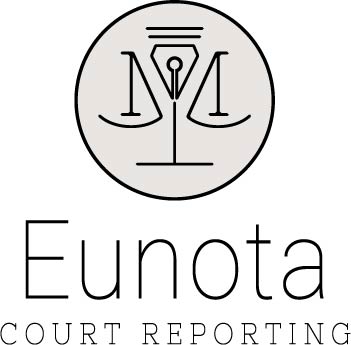Self-represented litigants in New Brunswick
In New Brunswick, self-represented litigants must hire their own stenographer from the private sector of certified companies or individuals to complete their case’s transcript. A transcript is essentially everything that was said, verbatim, in the courtroom during your case’s hearing or trial. Because the transcript is completed by an unbiased third party, it can be requested from the other side as well. This enables a solid and trustworthy middle ground upon which both parties can continue their arguments from. If you’re self-representing, you’re probably already feeling a little over your head with the need to learn common case law, legal jargon, and more. Eunota Court Reporting is here to help make at least this part of your journey a little easier.
The Process: Find Your Court Stenographer
It seems a little wonky that you need to do this step first, but you must do your research and find someone you trust to complete your transcript before submitting a request to the court. The reason you need to do this first is because there is a form you will need to fill out for the recording release request and on that form you must name the individual or company who will be preparing the official transcript for you. There are only a few companies and/or individuals in the province of New Brunswick who can prepare official transcripts for use in the courts. These parties have gone through training, testing, and certification to ensure that their transcription of a recording is verbatim and accurate.
Focus on your case while your stenographer prepares your transcript
Once your request is granted and the recording is released to your court stenographer, you can focus on other areas of your case (or maybe take a much needed break!). The court stenographer will get to work on your file and should be communicating with you regularly to give you updates and progress reports. In New Brunswick, it is common for the court stenographer to request a 50% advance on the transcript after they have estimated the cost of its production. This just ensures that they are not going to pour hours of detail-oriented work into a project that never is paid. Some court stenographers are wary of work with self-represented litigants for this reason- sometimes they fail to pay due to a number of reasons (financial issues being the main one). Ensure to pay your advance in a timely manner so your court stenographer can get to work right away!
Get in touch with your the Department of Justice Court Services where your case was heard
Once you have found a reliable court stenographer that you trust with your file (and who has the right credentials), you can go to the Department of Justice and fill out a form to request that a copy of your recording be duplicated and released. If the court decides to grant you the release of the recording, know that the recording will not go to you directly- it will be sent to your court stenographer. This ensures that there is no tampering with audio and that it is a true representation of what happened in the courtroom on the day of your case. A duplicate track is sent to the court stenographer and the original recording will remain at the court.
Receiving your transcript
You’ve just received news that your transcript is complete! This is great news. This is usually the time when your court stenographer will send you a second invoice for the remainder of the payment before the transcript is released. The opposing party will receive notification that the transcript has been completed and be invited to purchase their own copy as well. Your transcript should be offered to you in hard copy and pdf for ease of searching through it for items you need. In addition, it will come with the signed Certificate A which shows who was responsible for the recording machinery in the courtroom and an affidavit signed by the court stenographer and a Commissioner of Oaths to provide validation that the transcript was prepared to the best of their ability. The original signed affidavit(s), Certificate A and Certificate B (who duplicated the recording) originals will go to the court and you will receive copies.
Conclusions
Choosing to self-represent is a tough choice, and you want to make sure that you have the best support behind you as you take on this journey. Eunota Court Reporting is a certified transcription producing company that offers transcripts to both law firms and self-represented litigants in both official languages. We can prepare a transcript from any court in the province and employ a highly vetted team to work on your transcript to get it back to you faster. Eunota will provide support and updates to you every step of the way so that you feel involved and empowered through this process.
Please note that private sector stenographers are, by law, not able to produce transcripts from criminal or family cases. Those must be completed by public stenographers. For more information, please follow this link.
